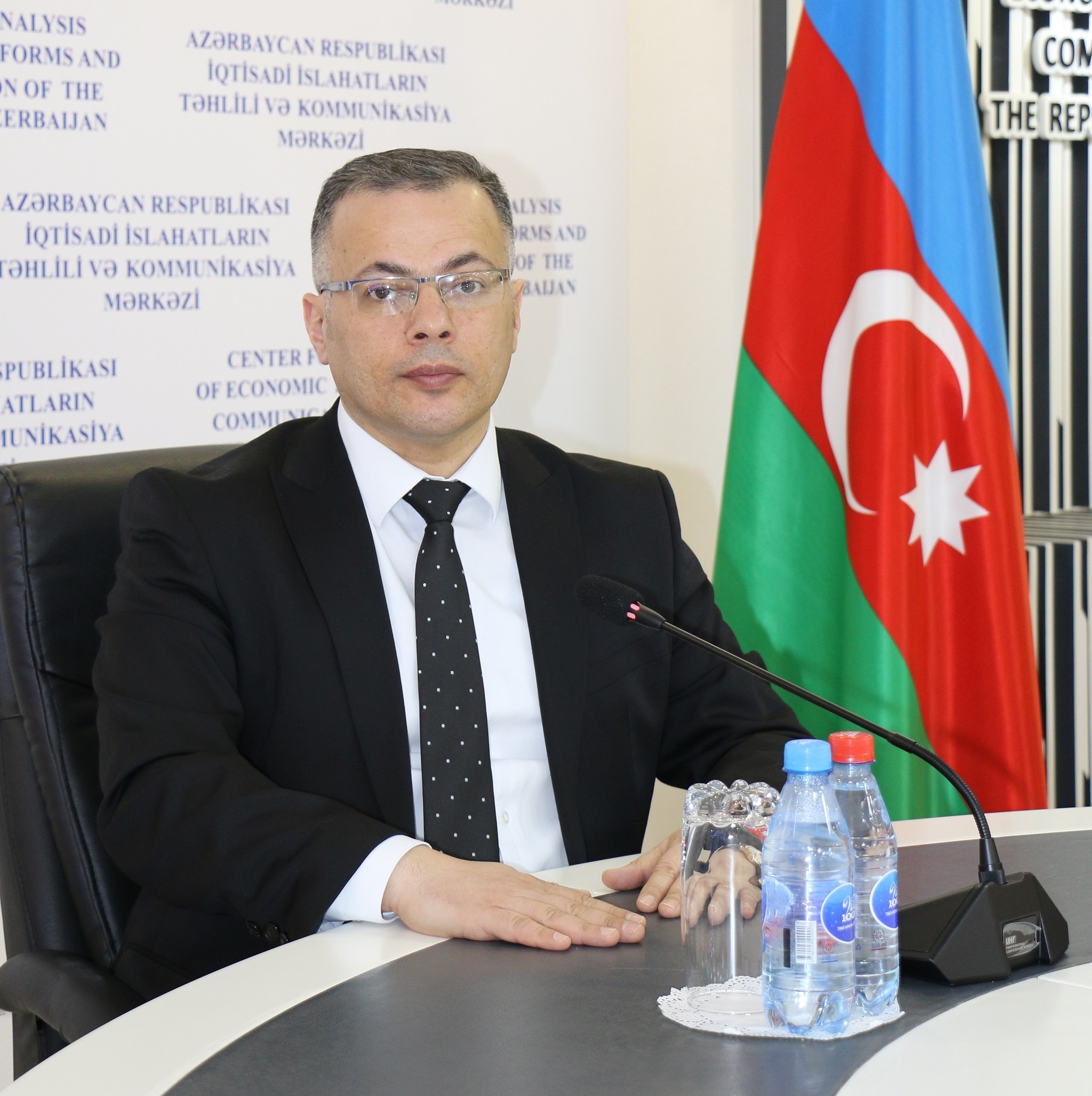
Vusal Gasimli: IMF Appreciated Quick Response of Azerbaijan to the Crisis
International Monetary Fund (IMF) Staff Concluding Statement of the 2021 Article IV Mission has been published. Executive Director of the Center for Analysis of Economic Reforms and Communication Vusal Gasimli commented on the main points of the statement. According to V.Gsimli, the statement mentions that Azerbaijan was hit hard by the COVID-19 pandemic and the decline in the oil price. He said, “Of course, besides listed reasons, drought, observed last year, and the successful Patriotic War launched in response to Armenia's military provocations also had affected the economy. IMF’s mission considers that the authorities of Azerbaijan responded promptly with policy measures to mitigate the impact of the shocks. Key policy priorities ahead include designing and implementing reforms to diversify the economy and improve its resilience to unexpected shocks. This should be accompanied by reforms to facilitate private sector development, including an improved business environment, governance, and transparency, and better access to finance. The statement also mentions that due to the ongoing vaccination and gradual opening of the economy, economic growth is projected to pick up to 2.3 percent in 2021 and growth in the non-oil sector – to 3.5 percent.
Considering the 2.6 percent contraction of the non-oil sector last year, this year's 3.6 percent growth forecast shows that the non-oil sector can not only fully recover but even exceed its pre-crisis volume. The 7.2 percent decline in the oil and gas sector last year will be offset by an increase in "blue fuel" production through the Southern Gas Corridor this year. By the way, 0.2 percent of real oil GDP growth is projected”.
V.Gasimli stated that although fiscal balance and current account balance moved from an important positive zone, observed before COVID-19, to a negative one, this year the recovery of “twin balance” is projected. He said, “the increases in gas exports, oil prices that exceed 70 US dollars, and double-digit growth in the non-oil exports suggest that the current account surplus will reach 2.4% of GDP this year. The consolidated budget deficit is projected to remain high at 5.6 percent of GDP, owing to continued COVID-19 spending and increased reconstruction spending in liberated territories, before starting to narrow to 3 percent next year. If we consider the state of “twin balances” and import inflation, the “corridor” targeted by the Central Bank is expected to be within 4 percent. The role of increasing factors in the risk balance of inflation has grown. Despite the rise in actual inflation against the background of non-monetary external and internal spending factors and the growth of money supply, it remains in the target corridor. The improvement of the "twin balance" and the admissible level of public debt also positively impact the stability of the manat - the main anchor of macroeconomic stability”.
V.Gasimli also noted that during 2020 – the year of crisis, the fiscal policy distinguished by its flexibility and automatic stabilizers responded to shocks. Moreover, the application of fiscal rules was suspended temporarily. “Development of new fiscal rules in a long-term period, improvements in the efficiency of public spending, generalized subsidies, public employment, and taxation, and the most important reforms in state agencies could support achieving fiscal consolidation. According to the "Rules for Evaluating the Effectiveness of Tax and Customs Concessions", it is anticipated to evaluate the economic and social effectiveness of existing or proposed tax and customs concessions and exemptions, along with the budget. These steps are also crucial for fiscal sustainability,” said V.Gasimli.
V. Gasimli has also commented on monetary policy issues indicated in the IMF statement. As he said, “The regulatory holiday and such measures aimed at the protection of consumer rights, acceleration of the transition to digitalization, increase of financial inclusion, online service channels promotion, maintaining financial discipline, further credit expansion, and supporting economic sustainability were applied in the year of crisis. Although the IMF report highlights lower interest rates and monetary easing, lending rates are still high. Capital adequacy and liquidity signs in the banking sector exceed the norm, and indicators of banks improve. Although the loan portfolio of the banking system increased by 3.8% in the first five months of this year, including business loans by 2.4%, monetary policy should have more contribution to economic activity and the real sector in the short term, as well as increase monetary transmission capacity.”
V.Gasimli concluded that the IMF statement has also touched upon structural reforms. “Exhaustion of oil resources, digital transformation, and green development paradigm, as well as reintegration of Karabakh, make it necessary to restructure the economy of Azerbaijan based on new national priorities approved by President Ilham Aliyev,” said V.Gasimli.








Op-eds
Agil Asadov
Head of the Strategic planning division
"Azerbaijan-China Relations: Formation and Perspectives"
Isa Gasimov
Head of the “Enterprise Azerbaijan” portal
Social entrepreneurship is an important tool for economic sustainability
Vusala Jafarova
Head of the Turkic World Research Center
"Driving Economic Integration and Digital Transformation: Azerbaijan’s Strategic Leadership in the Organization of…
Vusala Jafarova
Head of the Turkic World Research Center
"Azerbaijan’s Admission to the D-8: Strengthening Economic Cooperation with Global Potential"
Vusala Jafarova
Head of the Turkic World Research Center
Turkic States Economic Outlook for the First Half of 2024: Growth, Trade, and Investment Trends
Agil Asadov
Head of the Strategic planning division
Moody's: Growing influence of the Middle Corridor boosts economic prospects
Vusala Jafarova
Head of the Turkic World Research Center
The Karabakh Declaration and the future of economic cooperation of the Turkic world